ACC00724 - Retail Food Group Ltd: A Comprehensive Financial Analysis
VerifiedAdded on 2023/06/08
|14
|2341
|472
Report
AI Summary
This report presents a financial analysis of Retail Food Group Ltd, focusing on the horizontal analysis of the income statement from 2013 to 2017 and a detailed ratio analysis covering profitability, efficiency, liquidity, and capital structure. The horizontal analysis reveals trends in revenue, cost of sales, and net profit, highlighting areas for improvement in cost management. The ratio analysis assesses the company's return on assets and equity, operating and gross profit margins, inventory and debtor turnover, current and quick ratios, debt-to-asset ratio, interest coverage ratio, asset turnover, and earnings per share, offering insights into the company's financial health and operational efficiency. The analysis suggests areas where the company can improve its financial strategies to enhance profitability and meet shareholder expectations. Desklib provides a platform for students to access similar solved assignments and study resources.
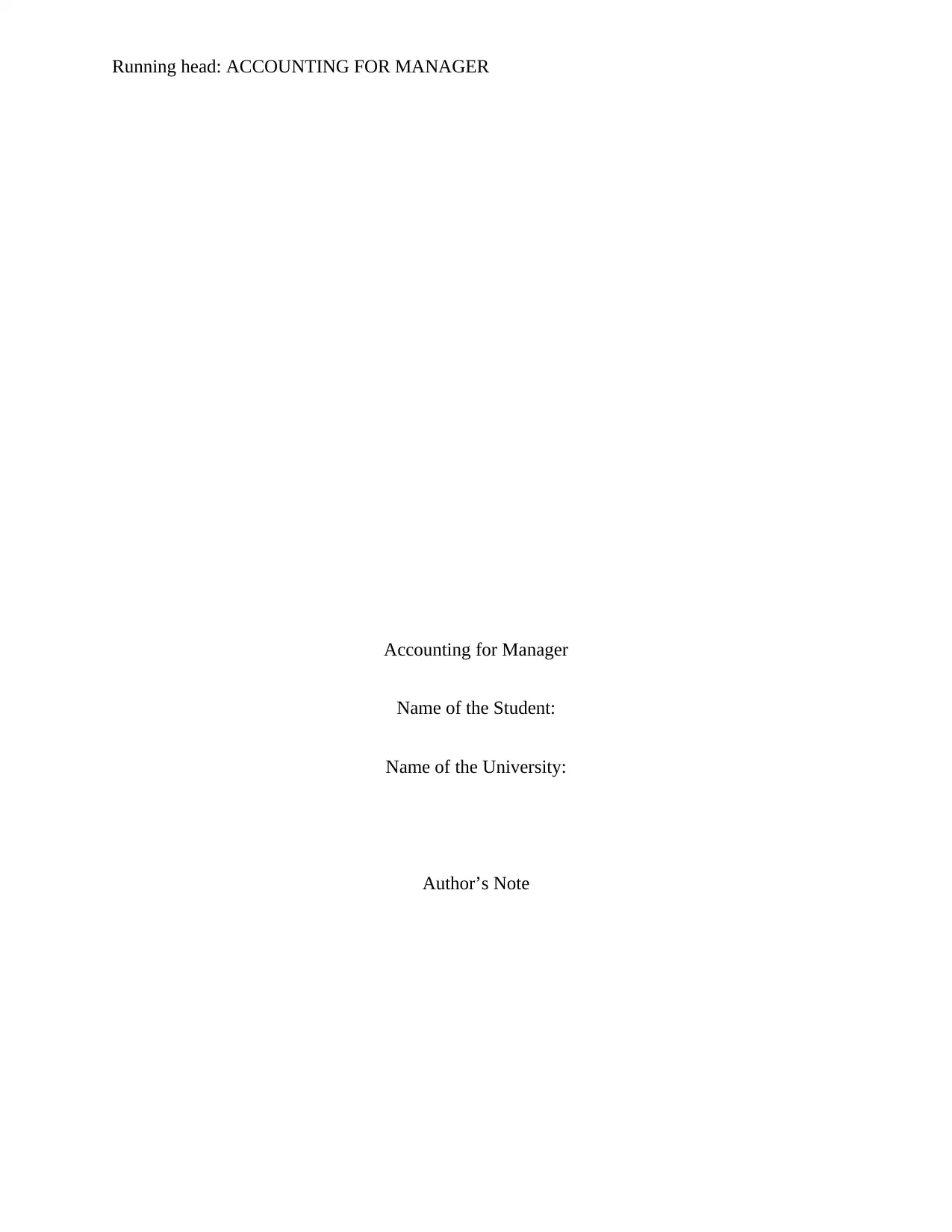
Running head: ACCOUNTING FOR MANAGER
Accounting for Manager
Name of the Student:
Name of the University:
Author’s Note
Accounting for Manager
Name of the Student:
Name of the University:
Author’s Note
Paraphrase This Document
Need a fresh take? Get an instant paraphrase of this document with our AI Paraphraser
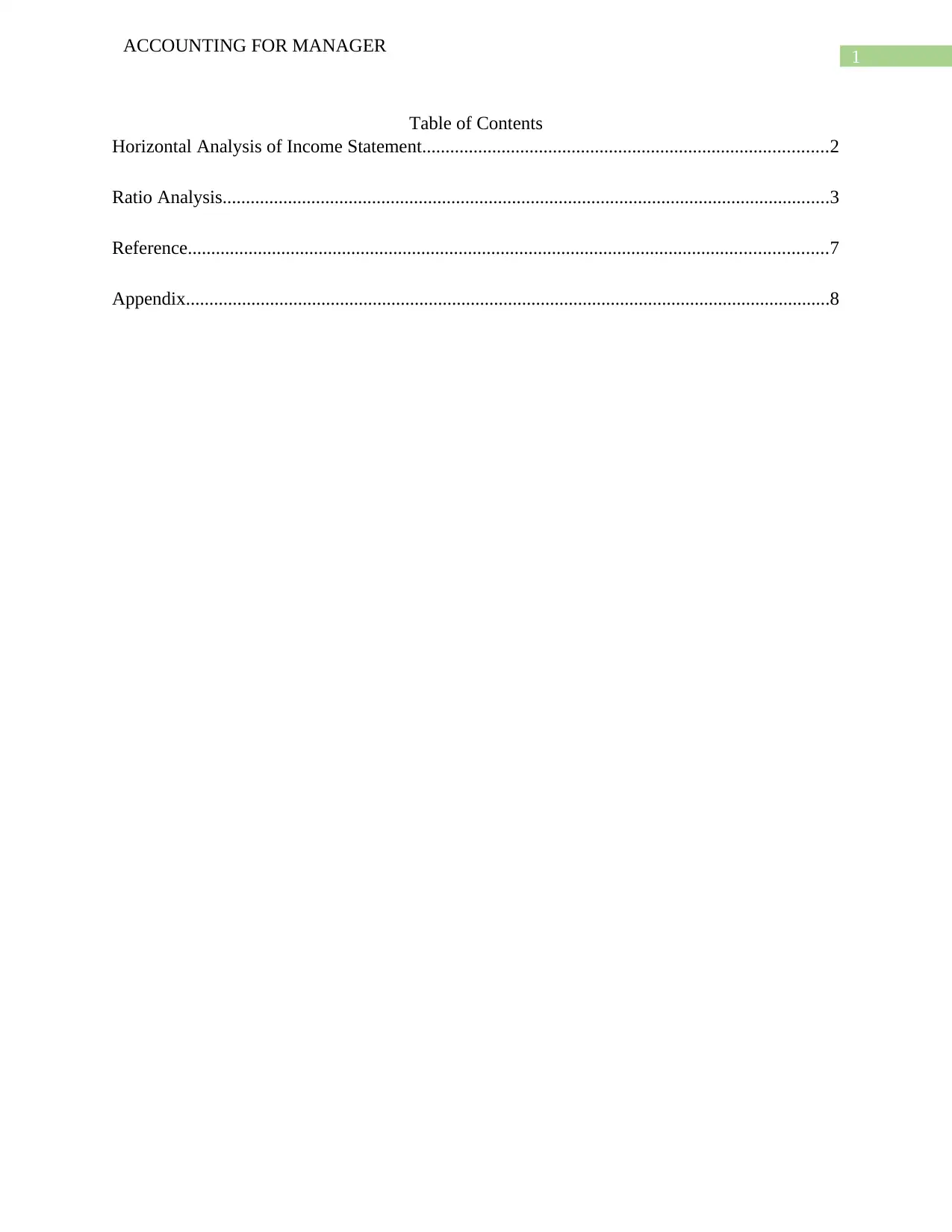
1
ACCOUNTING FOR MANAGER
Table of Contents
Horizontal Analysis of Income Statement.......................................................................................2
Ratio Analysis..................................................................................................................................3
Reference.........................................................................................................................................7
Appendix..........................................................................................................................................8
ACCOUNTING FOR MANAGER
Table of Contents
Horizontal Analysis of Income Statement.......................................................................................2
Ratio Analysis..................................................................................................................................3
Reference.........................................................................................................................................7
Appendix..........................................................................................................................................8
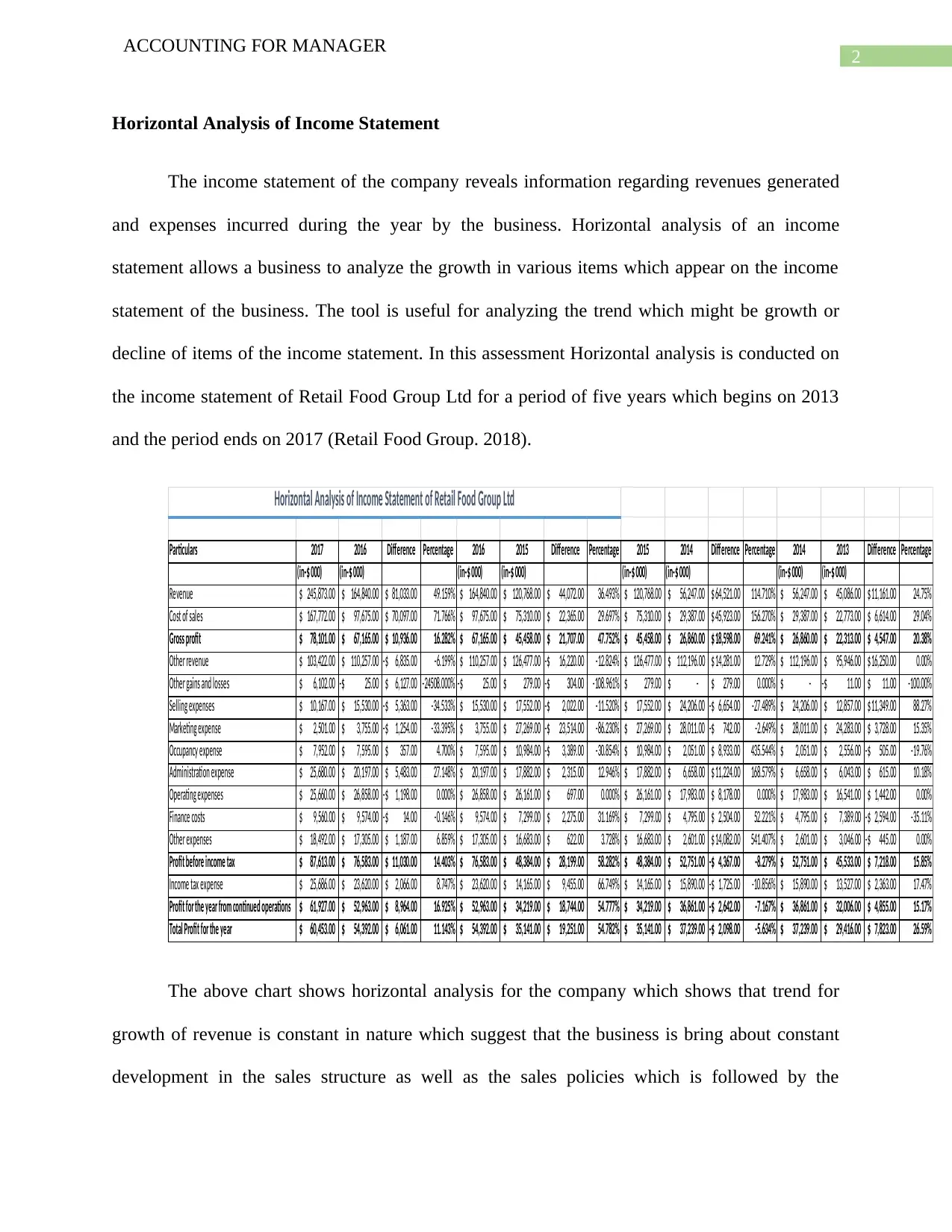
2
ACCOUNTING FOR MANAGER
Horizontal Analysis of Income Statement
The income statement of the company reveals information regarding revenues generated
and expenses incurred during the year by the business. Horizontal analysis of an income
statement allows a business to analyze the growth in various items which appear on the income
statement of the business. The tool is useful for analyzing the trend which might be growth or
decline of items of the income statement. In this assessment Horizontal analysis is conducted on
the income statement of Retail Food Group Ltd for a period of five years which begins on 2013
and the period ends on 2017 (Retail Food Group. 2018).
Particulars 2017 2016 Difference Percentage 2016 2015 Difference Percentage 2015 2014 Difference Percentage 2014 2013 Difference Percentage
(in-$ 000) (in-$ 000) (in-$ 000) (in-$ 000) (in-$ 000) (in-$ 000) (in-$ 000) (in-$ 000)
Revenue 245,873.00$ 164,840.00$ 81,033.00$ 49.159% 164,840.00$ 120,768.00$ 44,072.00$ 36.493% 120,768.00$ 56,247.00$ 64,521.00$ 114.710% 56,247.00$ 45,086.00$ 11,161.00$ 24.75%
Cost of sales 167,772.00$ 97,675.00$ 70,097.00$ 71.766% 97,675.00$ 75,310.00$ 22,365.00$ 29.697% 75,310.00$ 29,387.00$ 45,923.00$ 156.270% 29,387.00$ 22,773.00$ 6,614.00$ 29.04%
Gross profit 78,101.00$ 67,165.00$ 10,936.00$ 16.282% 67,165.00$ 45,458.00$ 21,707.00$ 47.752% 45,458.00$ 26,860.00$ 18,598.00$ 69.241% 26,860.00$ 22,313.00$ 4,547.00$ 20.38%
Other revenue 103,422.00$ 110,257.00$ 6,835.00-$ -6.199% 110,257.00$ 126,477.00$ 16,220.00-$ -12.824% 126,477.00$ 112,196.00$ 14,281.00$ 12.729% 112,196.00$ 95,946.00$ 16,250.00$ 0.00%
Other gains and losses 6,102.00$ 25.00-$ 6,127.00$ -24508.000% 25.00-$ 279.00$ 304.00-$ -108.961% 279.00$ -$ 279.00$ 0.000% -$ 11.00-$ 11.00$ -100.00%
Selling expenses 10,167.00$ 15,530.00$ 5,363.00-$ -34.533% 15,530.00$ 17,552.00$ 2,022.00-$ -11.520% 17,552.00$ 24,206.00$ 6,654.00-$ -27.489% 24,206.00$ 12,857.00$ 11,349.00$ 88.27%
Marketing expense 2,501.00$ 3,755.00$ 1,254.00-$ -33.395% 3,755.00$ 27,269.00$ 23,514.00-$ -86.230% 27,269.00$ 28,011.00$ 742.00-$ -2.649% 28,011.00$ 24,283.00$ 3,728.00$ 15.35%
Occupancy expense 7,952.00$ 7,595.00$ 357.00$ 4.700% 7,595.00$ 10,984.00$ 3,389.00-$ -30.854% 10,984.00$ 2,051.00$ 8,933.00$ 435.544% 2,051.00$ 2,556.00$ 505.00-$ -19.76%
Administration expense 25,680.00$ 20,197.00$ 5,483.00$ 27.148% 20,197.00$ 17,882.00$ 2,315.00$ 12.946% 17,882.00$ 6,658.00$ 11,224.00$ 168.579% 6,658.00$ 6,043.00$ 615.00$ 10.18%
Operating expenses 25,660.00$ 26,858.00$ 1,198.00-$ 0.000% 26,858.00$ 26,161.00$ 697.00$ 0.000% 26,161.00$ 17,983.00$ 8,178.00$ 0.000% 17,983.00$ 16,541.00$ 1,442.00$ 0.00%
Finance costs 9,560.00$ 9,574.00$ 14.00-$ -0.146% 9,574.00$ 7,299.00$ 2,275.00$ 31.169% 7,299.00$ 4,795.00$ 2,504.00$ 52.221% 4,795.00$ 7,389.00$ 2,594.00-$ -35.11%
Other expenses 18,492.00$ 17,305.00$ 1,187.00$ 6.859% 17,305.00$ 16,683.00$ 622.00$ 3.728% 16,683.00$ 2,601.00$ 14,082.00$ 541.407% 2,601.00$ 3,046.00$ 445.00-$ 0.00%
Profit before income tax 87,613.00$ 76,583.00$ 11,030.00$ 14.403% 76,583.00$ 48,384.00$ 28,199.00$ 58.282% 48,384.00$ 52,751.00$ 4,367.00-$ -8.279% 52,751.00$ 45,533.00$ 7,218.00$ 15.85%
Income tax expense 25,686.00$ 23,620.00$ 2,066.00$ 8.747% 23,620.00$ 14,165.00$ 9,455.00$ 66.749% 14,165.00$ 15,890.00$ 1,725.00-$ -10.856% 15,890.00$ 13,527.00$ 2,363.00$ 17.47%
Profit for the year from continued operations 61,927.00$ 52,963.00$ 8,964.00$ 16.925% 52,963.00$ 34,219.00$ 18,744.00$ 54.777% 34,219.00$ 36,861.00$ 2,642.00-$ -7.167% 36,861.00$ 32,006.00$ 4,855.00$ 15.17%
Total Profit for the year 60,453.00$ 54,392.00$ 6,061.00$ 11.143% 54,392.00$ 35,141.00$ 19,251.00$ 54.782% 35,141.00$ 37,239.00$ 2,098.00-$ -5.634% 37,239.00$ 29,416.00$ 7,823.00$ 26.59%
Horizontal Analysis of Income Statement of Retail Food Group Ltd
The above chart shows horizontal analysis for the company which shows that trend for
growth of revenue is constant in nature which suggest that the business is bring about constant
development in the sales structure as well as the sales policies which is followed by the
ACCOUNTING FOR MANAGER
Horizontal Analysis of Income Statement
The income statement of the company reveals information regarding revenues generated
and expenses incurred during the year by the business. Horizontal analysis of an income
statement allows a business to analyze the growth in various items which appear on the income
statement of the business. The tool is useful for analyzing the trend which might be growth or
decline of items of the income statement. In this assessment Horizontal analysis is conducted on
the income statement of Retail Food Group Ltd for a period of five years which begins on 2013
and the period ends on 2017 (Retail Food Group. 2018).
Particulars 2017 2016 Difference Percentage 2016 2015 Difference Percentage 2015 2014 Difference Percentage 2014 2013 Difference Percentage
(in-$ 000) (in-$ 000) (in-$ 000) (in-$ 000) (in-$ 000) (in-$ 000) (in-$ 000) (in-$ 000)
Revenue 245,873.00$ 164,840.00$ 81,033.00$ 49.159% 164,840.00$ 120,768.00$ 44,072.00$ 36.493% 120,768.00$ 56,247.00$ 64,521.00$ 114.710% 56,247.00$ 45,086.00$ 11,161.00$ 24.75%
Cost of sales 167,772.00$ 97,675.00$ 70,097.00$ 71.766% 97,675.00$ 75,310.00$ 22,365.00$ 29.697% 75,310.00$ 29,387.00$ 45,923.00$ 156.270% 29,387.00$ 22,773.00$ 6,614.00$ 29.04%
Gross profit 78,101.00$ 67,165.00$ 10,936.00$ 16.282% 67,165.00$ 45,458.00$ 21,707.00$ 47.752% 45,458.00$ 26,860.00$ 18,598.00$ 69.241% 26,860.00$ 22,313.00$ 4,547.00$ 20.38%
Other revenue 103,422.00$ 110,257.00$ 6,835.00-$ -6.199% 110,257.00$ 126,477.00$ 16,220.00-$ -12.824% 126,477.00$ 112,196.00$ 14,281.00$ 12.729% 112,196.00$ 95,946.00$ 16,250.00$ 0.00%
Other gains and losses 6,102.00$ 25.00-$ 6,127.00$ -24508.000% 25.00-$ 279.00$ 304.00-$ -108.961% 279.00$ -$ 279.00$ 0.000% -$ 11.00-$ 11.00$ -100.00%
Selling expenses 10,167.00$ 15,530.00$ 5,363.00-$ -34.533% 15,530.00$ 17,552.00$ 2,022.00-$ -11.520% 17,552.00$ 24,206.00$ 6,654.00-$ -27.489% 24,206.00$ 12,857.00$ 11,349.00$ 88.27%
Marketing expense 2,501.00$ 3,755.00$ 1,254.00-$ -33.395% 3,755.00$ 27,269.00$ 23,514.00-$ -86.230% 27,269.00$ 28,011.00$ 742.00-$ -2.649% 28,011.00$ 24,283.00$ 3,728.00$ 15.35%
Occupancy expense 7,952.00$ 7,595.00$ 357.00$ 4.700% 7,595.00$ 10,984.00$ 3,389.00-$ -30.854% 10,984.00$ 2,051.00$ 8,933.00$ 435.544% 2,051.00$ 2,556.00$ 505.00-$ -19.76%
Administration expense 25,680.00$ 20,197.00$ 5,483.00$ 27.148% 20,197.00$ 17,882.00$ 2,315.00$ 12.946% 17,882.00$ 6,658.00$ 11,224.00$ 168.579% 6,658.00$ 6,043.00$ 615.00$ 10.18%
Operating expenses 25,660.00$ 26,858.00$ 1,198.00-$ 0.000% 26,858.00$ 26,161.00$ 697.00$ 0.000% 26,161.00$ 17,983.00$ 8,178.00$ 0.000% 17,983.00$ 16,541.00$ 1,442.00$ 0.00%
Finance costs 9,560.00$ 9,574.00$ 14.00-$ -0.146% 9,574.00$ 7,299.00$ 2,275.00$ 31.169% 7,299.00$ 4,795.00$ 2,504.00$ 52.221% 4,795.00$ 7,389.00$ 2,594.00-$ -35.11%
Other expenses 18,492.00$ 17,305.00$ 1,187.00$ 6.859% 17,305.00$ 16,683.00$ 622.00$ 3.728% 16,683.00$ 2,601.00$ 14,082.00$ 541.407% 2,601.00$ 3,046.00$ 445.00-$ 0.00%
Profit before income tax 87,613.00$ 76,583.00$ 11,030.00$ 14.403% 76,583.00$ 48,384.00$ 28,199.00$ 58.282% 48,384.00$ 52,751.00$ 4,367.00-$ -8.279% 52,751.00$ 45,533.00$ 7,218.00$ 15.85%
Income tax expense 25,686.00$ 23,620.00$ 2,066.00$ 8.747% 23,620.00$ 14,165.00$ 9,455.00$ 66.749% 14,165.00$ 15,890.00$ 1,725.00-$ -10.856% 15,890.00$ 13,527.00$ 2,363.00$ 17.47%
Profit for the year from continued operations 61,927.00$ 52,963.00$ 8,964.00$ 16.925% 52,963.00$ 34,219.00$ 18,744.00$ 54.777% 34,219.00$ 36,861.00$ 2,642.00-$ -7.167% 36,861.00$ 32,006.00$ 4,855.00$ 15.17%
Total Profit for the year 60,453.00$ 54,392.00$ 6,061.00$ 11.143% 54,392.00$ 35,141.00$ 19,251.00$ 54.782% 35,141.00$ 37,239.00$ 2,098.00-$ -5.634% 37,239.00$ 29,416.00$ 7,823.00$ 26.59%
Horizontal Analysis of Income Statement of Retail Food Group Ltd
The above chart shows horizontal analysis for the company which shows that trend for
growth of revenue is constant in nature which suggest that the business is bring about constant
development in the sales structure as well as the sales policies which is followed by the
⊘ This is a preview!⊘
Do you want full access?
Subscribe today to unlock all pages.

Trusted by 1+ million students worldwide
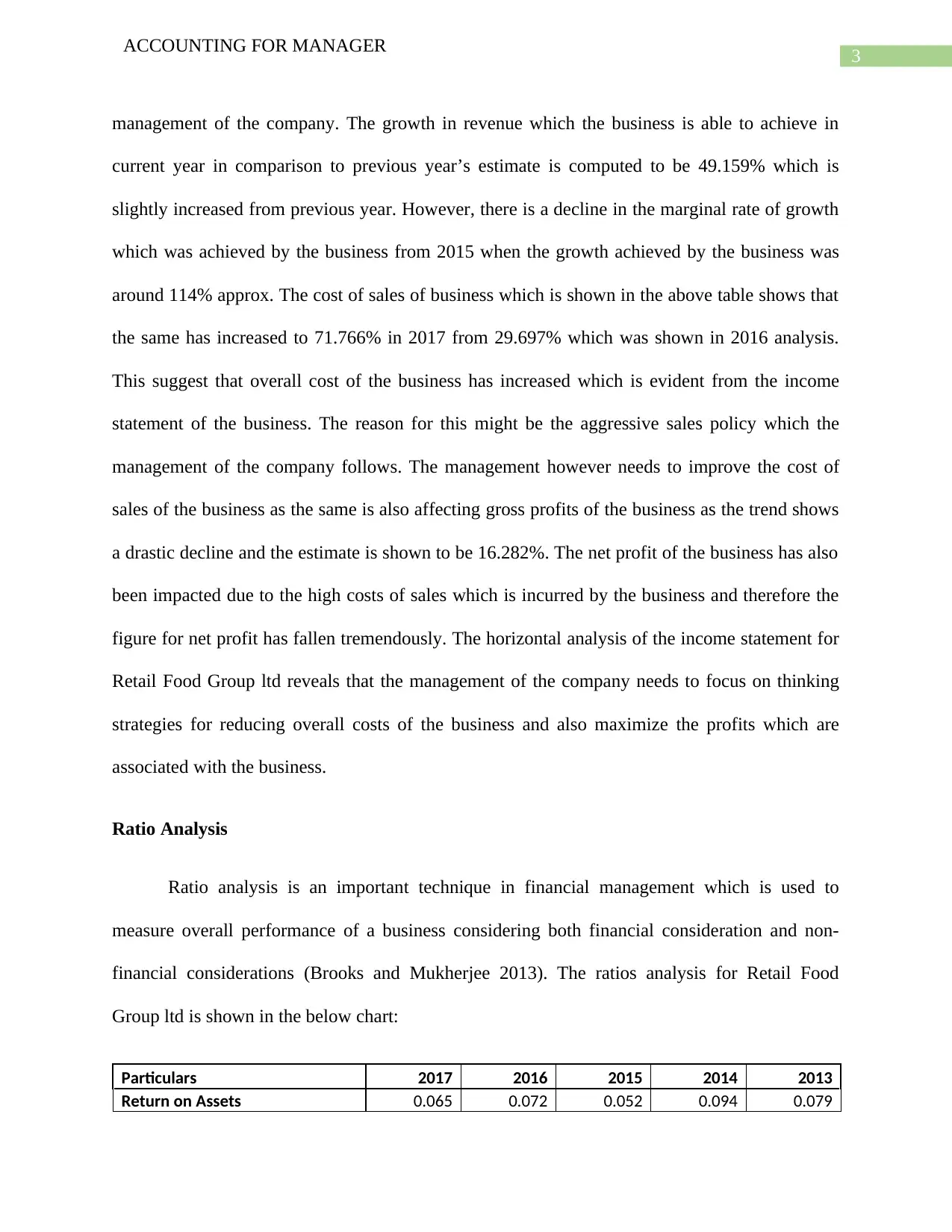
3
ACCOUNTING FOR MANAGER
management of the company. The growth in revenue which the business is able to achieve in
current year in comparison to previous year’s estimate is computed to be 49.159% which is
slightly increased from previous year. However, there is a decline in the marginal rate of growth
which was achieved by the business from 2015 when the growth achieved by the business was
around 114% approx. The cost of sales of business which is shown in the above table shows that
the same has increased to 71.766% in 2017 from 29.697% which was shown in 2016 analysis.
This suggest that overall cost of the business has increased which is evident from the income
statement of the business. The reason for this might be the aggressive sales policy which the
management of the company follows. The management however needs to improve the cost of
sales of the business as the same is also affecting gross profits of the business as the trend shows
a drastic decline and the estimate is shown to be 16.282%. The net profit of the business has also
been impacted due to the high costs of sales which is incurred by the business and therefore the
figure for net profit has fallen tremendously. The horizontal analysis of the income statement for
Retail Food Group ltd reveals that the management of the company needs to focus on thinking
strategies for reducing overall costs of the business and also maximize the profits which are
associated with the business.
Ratio Analysis
Ratio analysis is an important technique in financial management which is used to
measure overall performance of a business considering both financial consideration and non-
financial considerations (Brooks and Mukherjee 2013). The ratios analysis for Retail Food
Group ltd is shown in the below chart:
Particulars 2017 2016 2015 2014 2013
Return on Assets 0.065 0.072 0.052 0.094 0.079
ACCOUNTING FOR MANAGER
management of the company. The growth in revenue which the business is able to achieve in
current year in comparison to previous year’s estimate is computed to be 49.159% which is
slightly increased from previous year. However, there is a decline in the marginal rate of growth
which was achieved by the business from 2015 when the growth achieved by the business was
around 114% approx. The cost of sales of business which is shown in the above table shows that
the same has increased to 71.766% in 2017 from 29.697% which was shown in 2016 analysis.
This suggest that overall cost of the business has increased which is evident from the income
statement of the business. The reason for this might be the aggressive sales policy which the
management of the company follows. The management however needs to improve the cost of
sales of the business as the same is also affecting gross profits of the business as the trend shows
a drastic decline and the estimate is shown to be 16.282%. The net profit of the business has also
been impacted due to the high costs of sales which is incurred by the business and therefore the
figure for net profit has fallen tremendously. The horizontal analysis of the income statement for
Retail Food Group ltd reveals that the management of the company needs to focus on thinking
strategies for reducing overall costs of the business and also maximize the profits which are
associated with the business.
Ratio Analysis
Ratio analysis is an important technique in financial management which is used to
measure overall performance of a business considering both financial consideration and non-
financial considerations (Brooks and Mukherjee 2013). The ratios analysis for Retail Food
Group ltd is shown in the below chart:
Particulars 2017 2016 2015 2014 2013
Return on Assets 0.065 0.072 0.052 0.094 0.079
Paraphrase This Document
Need a fresh take? Get an instant paraphrase of this document with our AI Paraphraser
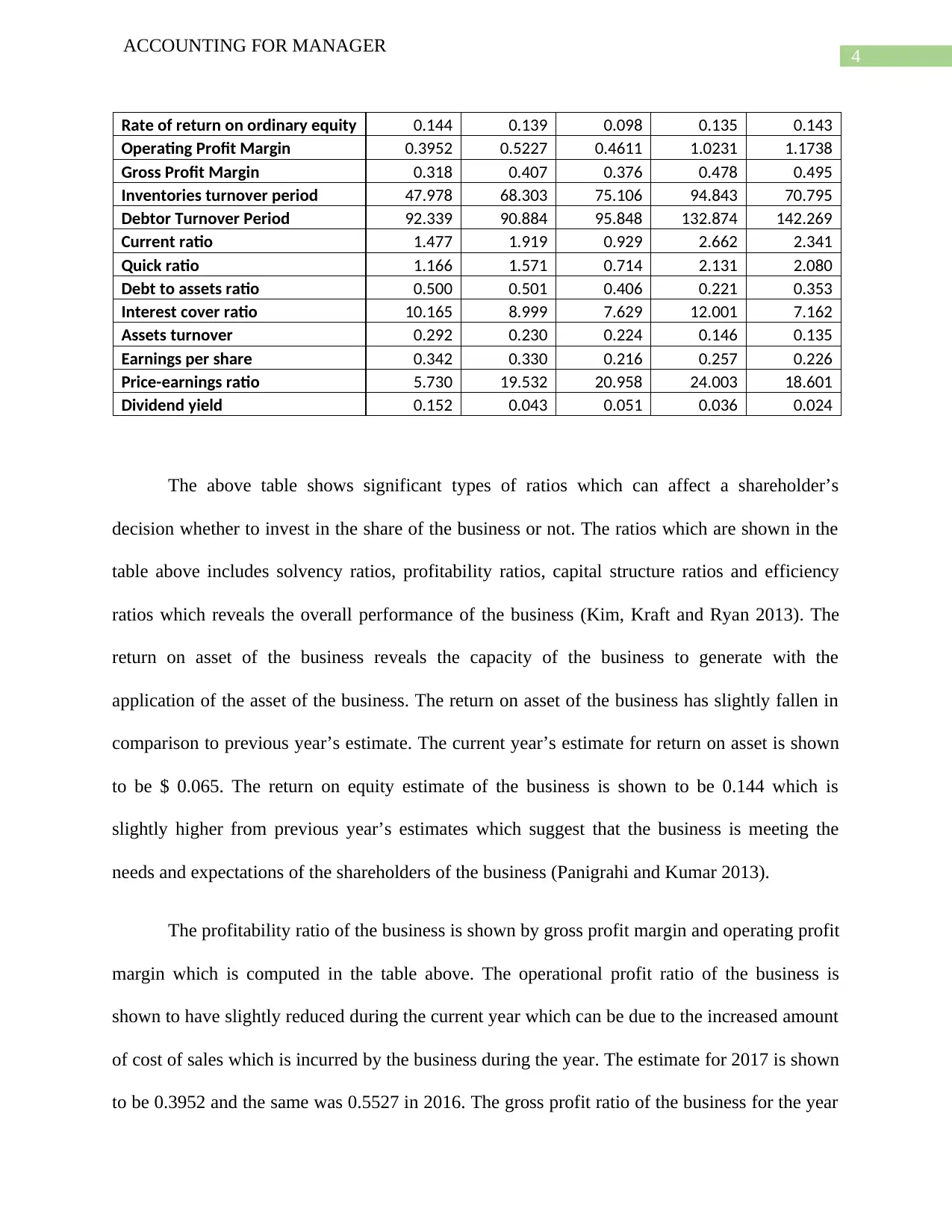
4
ACCOUNTING FOR MANAGER
Rate of return on ordinary equity 0.144 0.139 0.098 0.135 0.143
Operating Profit Margin 0.3952 0.5227 0.4611 1.0231 1.1738
Gross Profit Margin 0.318 0.407 0.376 0.478 0.495
Inventories turnover period 47.978 68.303 75.106 94.843 70.795
Debtor Turnover Period 92.339 90.884 95.848 132.874 142.269
Current ratio 1.477 1.919 0.929 2.662 2.341
Quick ratio 1.166 1.571 0.714 2.131 2.080
Debt to assets ratio 0.500 0.501 0.406 0.221 0.353
Interest cover ratio 10.165 8.999 7.629 12.001 7.162
Assets turnover 0.292 0.230 0.224 0.146 0.135
Earnings per share 0.342 0.330 0.216 0.257 0.226
Price-earnings ratio 5.730 19.532 20.958 24.003 18.601
Dividend yield 0.152 0.043 0.051 0.036 0.024
The above table shows significant types of ratios which can affect a shareholder’s
decision whether to invest in the share of the business or not. The ratios which are shown in the
table above includes solvency ratios, profitability ratios, capital structure ratios and efficiency
ratios which reveals the overall performance of the business (Kim, Kraft and Ryan 2013). The
return on asset of the business reveals the capacity of the business to generate with the
application of the asset of the business. The return on asset of the business has slightly fallen in
comparison to previous year’s estimate. The current year’s estimate for return on asset is shown
to be $ 0.065. The return on equity estimate of the business is shown to be 0.144 which is
slightly higher from previous year’s estimates which suggest that the business is meeting the
needs and expectations of the shareholders of the business (Panigrahi and Kumar 2013).
The profitability ratio of the business is shown by gross profit margin and operating profit
margin which is computed in the table above. The operational profit ratio of the business is
shown to have slightly reduced during the current year which can be due to the increased amount
of cost of sales which is incurred by the business during the year. The estimate for 2017 is shown
to be 0.3952 and the same was 0.5527 in 2016. The gross profit ratio of the business for the year
ACCOUNTING FOR MANAGER
Rate of return on ordinary equity 0.144 0.139 0.098 0.135 0.143
Operating Profit Margin 0.3952 0.5227 0.4611 1.0231 1.1738
Gross Profit Margin 0.318 0.407 0.376 0.478 0.495
Inventories turnover period 47.978 68.303 75.106 94.843 70.795
Debtor Turnover Period 92.339 90.884 95.848 132.874 142.269
Current ratio 1.477 1.919 0.929 2.662 2.341
Quick ratio 1.166 1.571 0.714 2.131 2.080
Debt to assets ratio 0.500 0.501 0.406 0.221 0.353
Interest cover ratio 10.165 8.999 7.629 12.001 7.162
Assets turnover 0.292 0.230 0.224 0.146 0.135
Earnings per share 0.342 0.330 0.216 0.257 0.226
Price-earnings ratio 5.730 19.532 20.958 24.003 18.601
Dividend yield 0.152 0.043 0.051 0.036 0.024
The above table shows significant types of ratios which can affect a shareholder’s
decision whether to invest in the share of the business or not. The ratios which are shown in the
table above includes solvency ratios, profitability ratios, capital structure ratios and efficiency
ratios which reveals the overall performance of the business (Kim, Kraft and Ryan 2013). The
return on asset of the business reveals the capacity of the business to generate with the
application of the asset of the business. The return on asset of the business has slightly fallen in
comparison to previous year’s estimate. The current year’s estimate for return on asset is shown
to be $ 0.065. The return on equity estimate of the business is shown to be 0.144 which is
slightly higher from previous year’s estimates which suggest that the business is meeting the
needs and expectations of the shareholders of the business (Panigrahi and Kumar 2013).
The profitability ratio of the business is shown by gross profit margin and operating profit
margin which is computed in the table above. The operational profit ratio of the business is
shown to have slightly reduced during the current year which can be due to the increased amount
of cost of sales which is incurred by the business during the year. The estimate for 2017 is shown
to be 0.3952 and the same was 0.5527 in 2016. The gross profit ratio of the business for the year
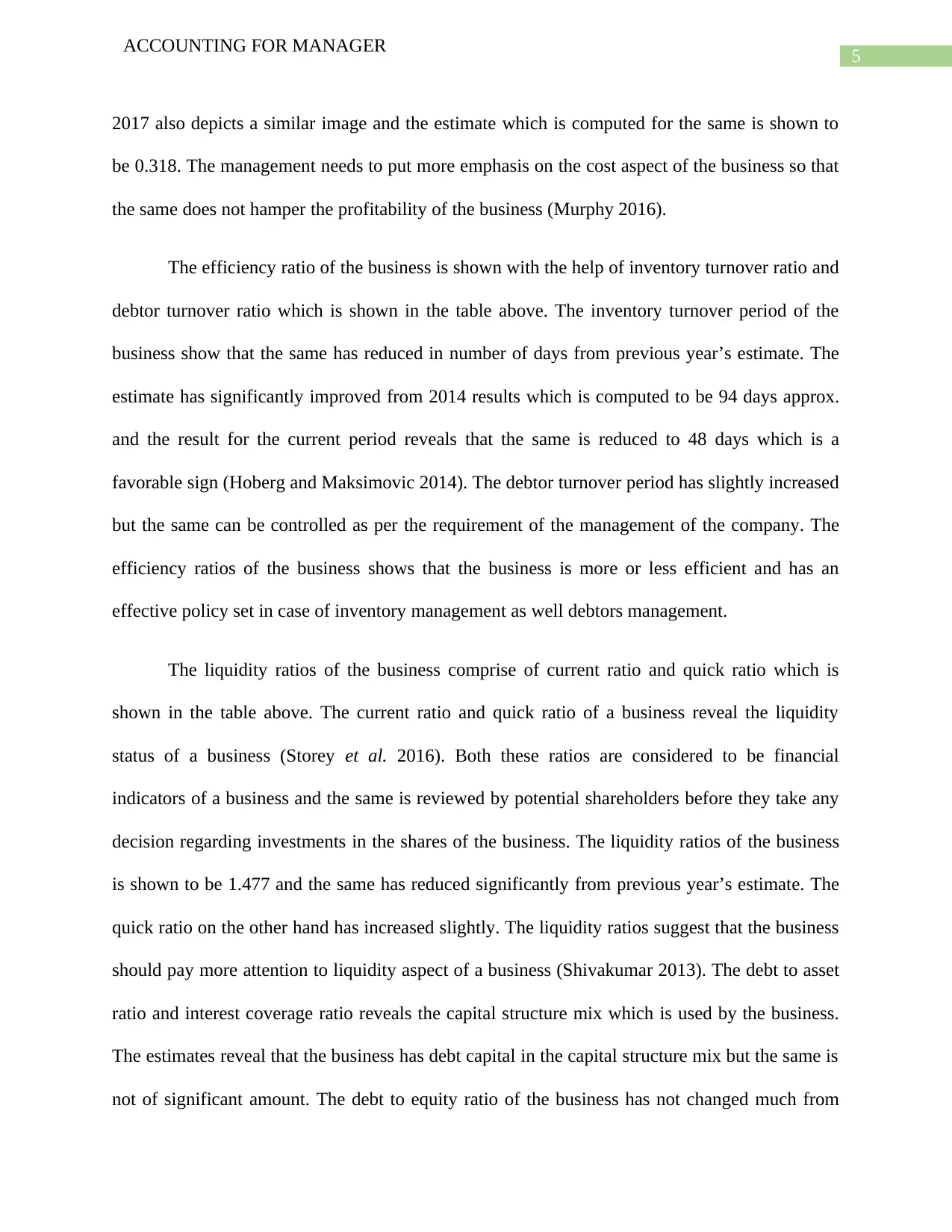
5
ACCOUNTING FOR MANAGER
2017 also depicts a similar image and the estimate which is computed for the same is shown to
be 0.318. The management needs to put more emphasis on the cost aspect of the business so that
the same does not hamper the profitability of the business (Murphy 2016).
The efficiency ratio of the business is shown with the help of inventory turnover ratio and
debtor turnover ratio which is shown in the table above. The inventory turnover period of the
business show that the same has reduced in number of days from previous year’s estimate. The
estimate has significantly improved from 2014 results which is computed to be 94 days approx.
and the result for the current period reveals that the same is reduced to 48 days which is a
favorable sign (Hoberg and Maksimovic 2014). The debtor turnover period has slightly increased
but the same can be controlled as per the requirement of the management of the company. The
efficiency ratios of the business shows that the business is more or less efficient and has an
effective policy set in case of inventory management as well debtors management.
The liquidity ratios of the business comprise of current ratio and quick ratio which is
shown in the table above. The current ratio and quick ratio of a business reveal the liquidity
status of a business (Storey et al. 2016). Both these ratios are considered to be financial
indicators of a business and the same is reviewed by potential shareholders before they take any
decision regarding investments in the shares of the business. The liquidity ratios of the business
is shown to be 1.477 and the same has reduced significantly from previous year’s estimate. The
quick ratio on the other hand has increased slightly. The liquidity ratios suggest that the business
should pay more attention to liquidity aspect of a business (Shivakumar 2013). The debt to asset
ratio and interest coverage ratio reveals the capital structure mix which is used by the business.
The estimates reveal that the business has debt capital in the capital structure mix but the same is
not of significant amount. The debt to equity ratio of the business has not changed much from
ACCOUNTING FOR MANAGER
2017 also depicts a similar image and the estimate which is computed for the same is shown to
be 0.318. The management needs to put more emphasis on the cost aspect of the business so that
the same does not hamper the profitability of the business (Murphy 2016).
The efficiency ratio of the business is shown with the help of inventory turnover ratio and
debtor turnover ratio which is shown in the table above. The inventory turnover period of the
business show that the same has reduced in number of days from previous year’s estimate. The
estimate has significantly improved from 2014 results which is computed to be 94 days approx.
and the result for the current period reveals that the same is reduced to 48 days which is a
favorable sign (Hoberg and Maksimovic 2014). The debtor turnover period has slightly increased
but the same can be controlled as per the requirement of the management of the company. The
efficiency ratios of the business shows that the business is more or less efficient and has an
effective policy set in case of inventory management as well debtors management.
The liquidity ratios of the business comprise of current ratio and quick ratio which is
shown in the table above. The current ratio and quick ratio of a business reveal the liquidity
status of a business (Storey et al. 2016). Both these ratios are considered to be financial
indicators of a business and the same is reviewed by potential shareholders before they take any
decision regarding investments in the shares of the business. The liquidity ratios of the business
is shown to be 1.477 and the same has reduced significantly from previous year’s estimate. The
quick ratio on the other hand has increased slightly. The liquidity ratios suggest that the business
should pay more attention to liquidity aspect of a business (Shivakumar 2013). The debt to asset
ratio and interest coverage ratio reveals the capital structure mix which is used by the business.
The estimates reveal that the business has debt capital in the capital structure mix but the same is
not of significant amount. The debt to equity ratio of the business has not changed much from
⊘ This is a preview!⊘
Do you want full access?
Subscribe today to unlock all pages.

Trusted by 1+ million students worldwide
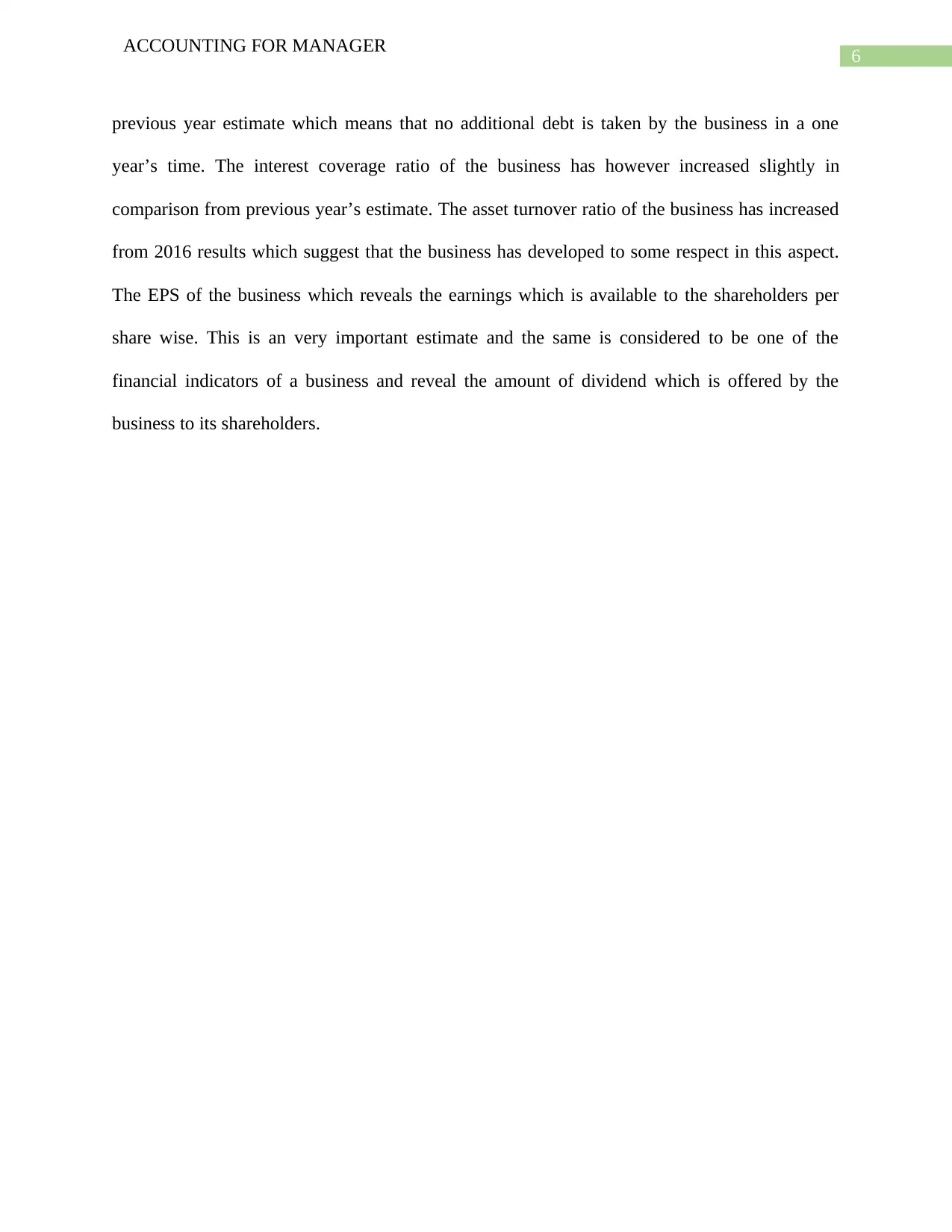
6
ACCOUNTING FOR MANAGER
previous year estimate which means that no additional debt is taken by the business in a one
year’s time. The interest coverage ratio of the business has however increased slightly in
comparison from previous year’s estimate. The asset turnover ratio of the business has increased
from 2016 results which suggest that the business has developed to some respect in this aspect.
The EPS of the business which reveals the earnings which is available to the shareholders per
share wise. This is an very important estimate and the same is considered to be one of the
financial indicators of a business and reveal the amount of dividend which is offered by the
business to its shareholders.
ACCOUNTING FOR MANAGER
previous year estimate which means that no additional debt is taken by the business in a one
year’s time. The interest coverage ratio of the business has however increased slightly in
comparison from previous year’s estimate. The asset turnover ratio of the business has increased
from 2016 results which suggest that the business has developed to some respect in this aspect.
The EPS of the business which reveals the earnings which is available to the shareholders per
share wise. This is an very important estimate and the same is considered to be one of the
financial indicators of a business and reveal the amount of dividend which is offered by the
business to its shareholders.
Paraphrase This Document
Need a fresh take? Get an instant paraphrase of this document with our AI Paraphraser
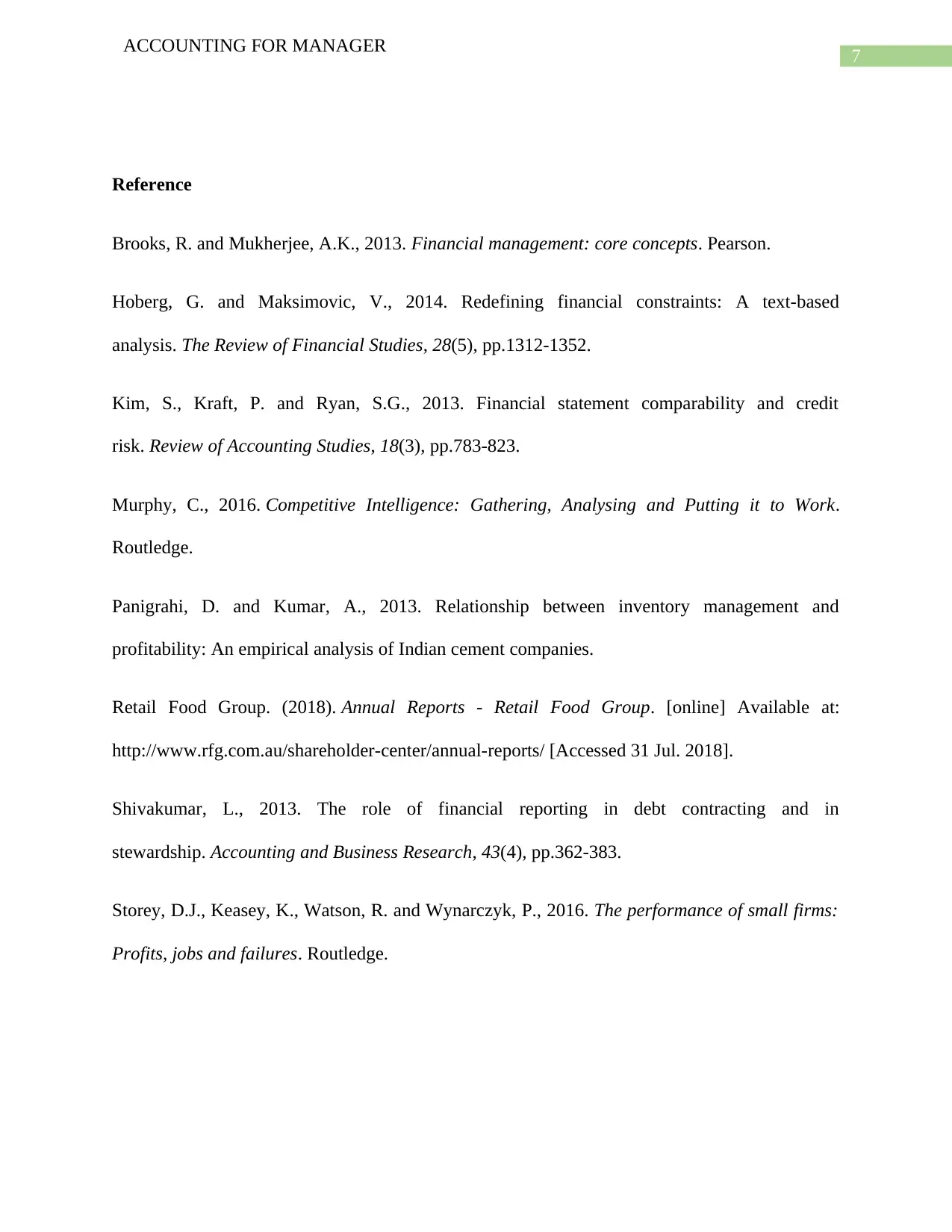
7
ACCOUNTING FOR MANAGER
Reference
Brooks, R. and Mukherjee, A.K., 2013. Financial management: core concepts. Pearson.
Hoberg, G. and Maksimovic, V., 2014. Redefining financial constraints: A text-based
analysis. The Review of Financial Studies, 28(5), pp.1312-1352.
Kim, S., Kraft, P. and Ryan, S.G., 2013. Financial statement comparability and credit
risk. Review of Accounting Studies, 18(3), pp.783-823.
Murphy, C., 2016. Competitive Intelligence: Gathering, Analysing and Putting it to Work.
Routledge.
Panigrahi, D. and Kumar, A., 2013. Relationship between inventory management and
profitability: An empirical analysis of Indian cement companies.
Retail Food Group. (2018). Annual Reports - Retail Food Group. [online] Available at:
http://www.rfg.com.au/shareholder-center/annual-reports/ [Accessed 31 Jul. 2018].
Shivakumar, L., 2013. The role of financial reporting in debt contracting and in
stewardship. Accounting and Business Research, 43(4), pp.362-383.
Storey, D.J., Keasey, K., Watson, R. and Wynarczyk, P., 2016. The performance of small firms:
Profits, jobs and failures. Routledge.
ACCOUNTING FOR MANAGER
Reference
Brooks, R. and Mukherjee, A.K., 2013. Financial management: core concepts. Pearson.
Hoberg, G. and Maksimovic, V., 2014. Redefining financial constraints: A text-based
analysis. The Review of Financial Studies, 28(5), pp.1312-1352.
Kim, S., Kraft, P. and Ryan, S.G., 2013. Financial statement comparability and credit
risk. Review of Accounting Studies, 18(3), pp.783-823.
Murphy, C., 2016. Competitive Intelligence: Gathering, Analysing and Putting it to Work.
Routledge.
Panigrahi, D. and Kumar, A., 2013. Relationship between inventory management and
profitability: An empirical analysis of Indian cement companies.
Retail Food Group. (2018). Annual Reports - Retail Food Group. [online] Available at:
http://www.rfg.com.au/shareholder-center/annual-reports/ [Accessed 31 Jul. 2018].
Shivakumar, L., 2013. The role of financial reporting in debt contracting and in
stewardship. Accounting and Business Research, 43(4), pp.362-383.
Storey, D.J., Keasey, K., Watson, R. and Wynarczyk, P., 2016. The performance of small firms:
Profits, jobs and failures. Routledge.
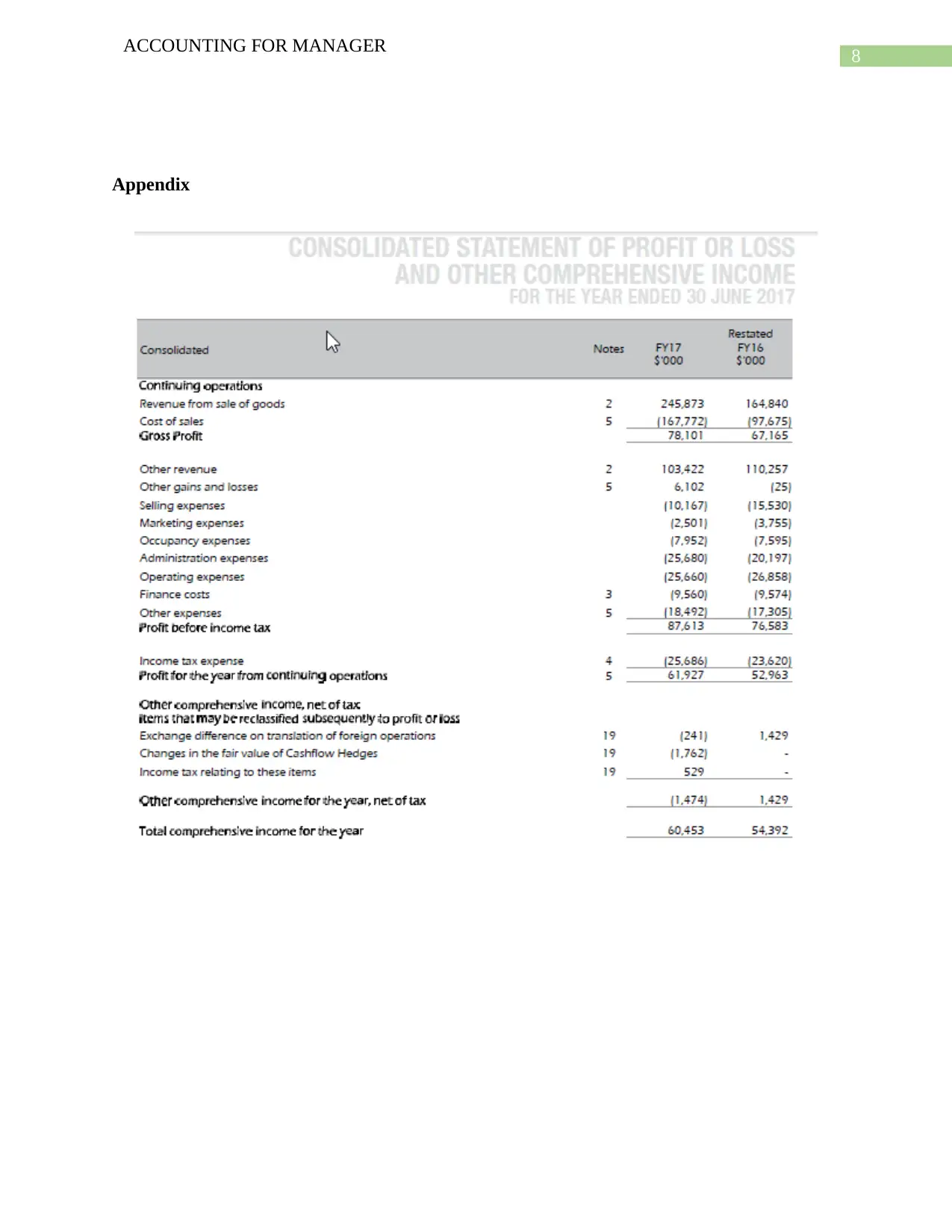
8
ACCOUNTING FOR MANAGER
Appendix
ACCOUNTING FOR MANAGER
Appendix
⊘ This is a preview!⊘
Do you want full access?
Subscribe today to unlock all pages.

Trusted by 1+ million students worldwide
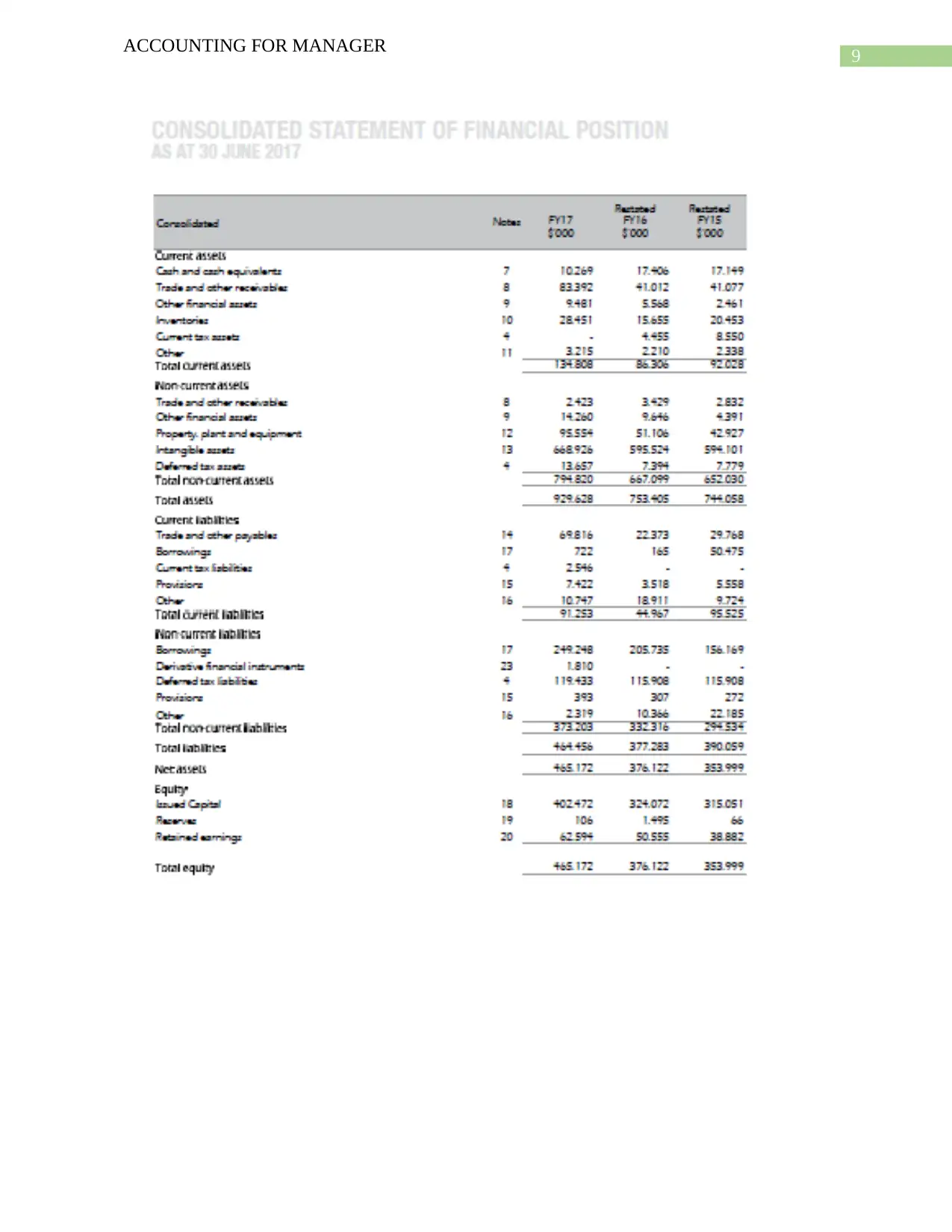
9
ACCOUNTING FOR MANAGER
ACCOUNTING FOR MANAGER
Paraphrase This Document
Need a fresh take? Get an instant paraphrase of this document with our AI Paraphraser
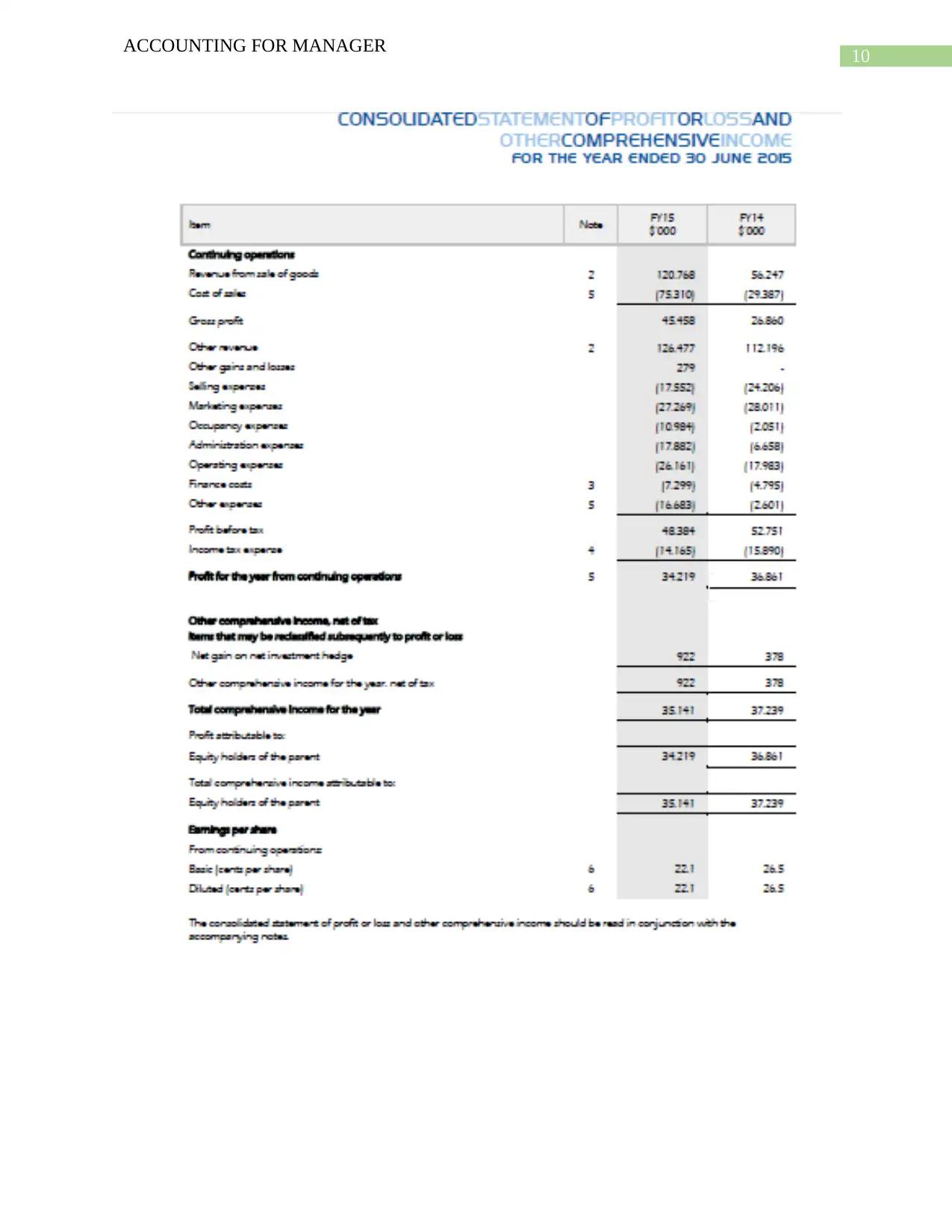
10
ACCOUNTING FOR MANAGER
ACCOUNTING FOR MANAGER
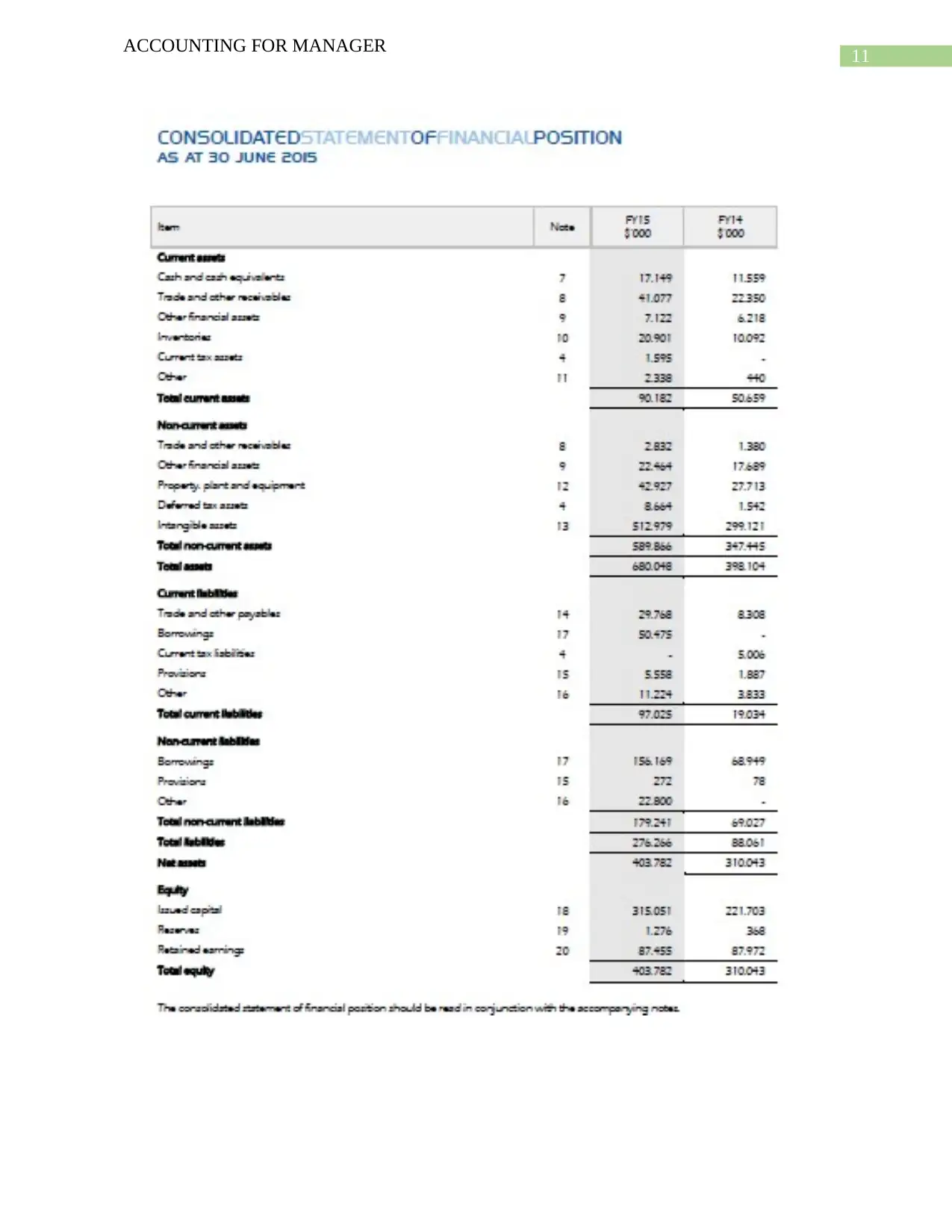
11
ACCOUNTING FOR MANAGER
ACCOUNTING FOR MANAGER
⊘ This is a preview!⊘
Do you want full access?
Subscribe today to unlock all pages.

Trusted by 1+ million students worldwide
1 out of 14
Related Documents
Your All-in-One AI-Powered Toolkit for Academic Success.
+13062052269
info@desklib.com
Available 24*7 on WhatsApp / Email
![[object Object]](/_next/static/media/star-bottom.7253800d.svg)
Unlock your academic potential
Copyright © 2020–2026 A2Z Services. All Rights Reserved. Developed and managed by ZUCOL.



